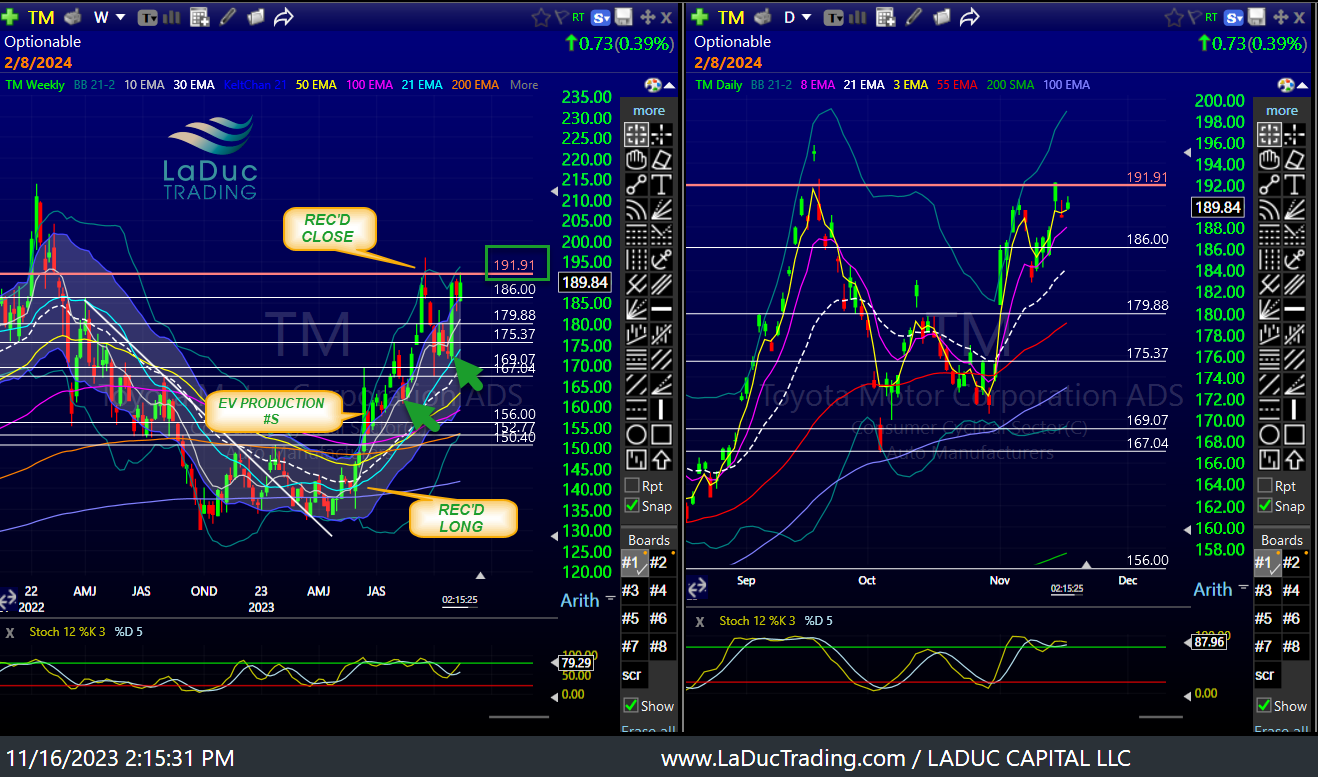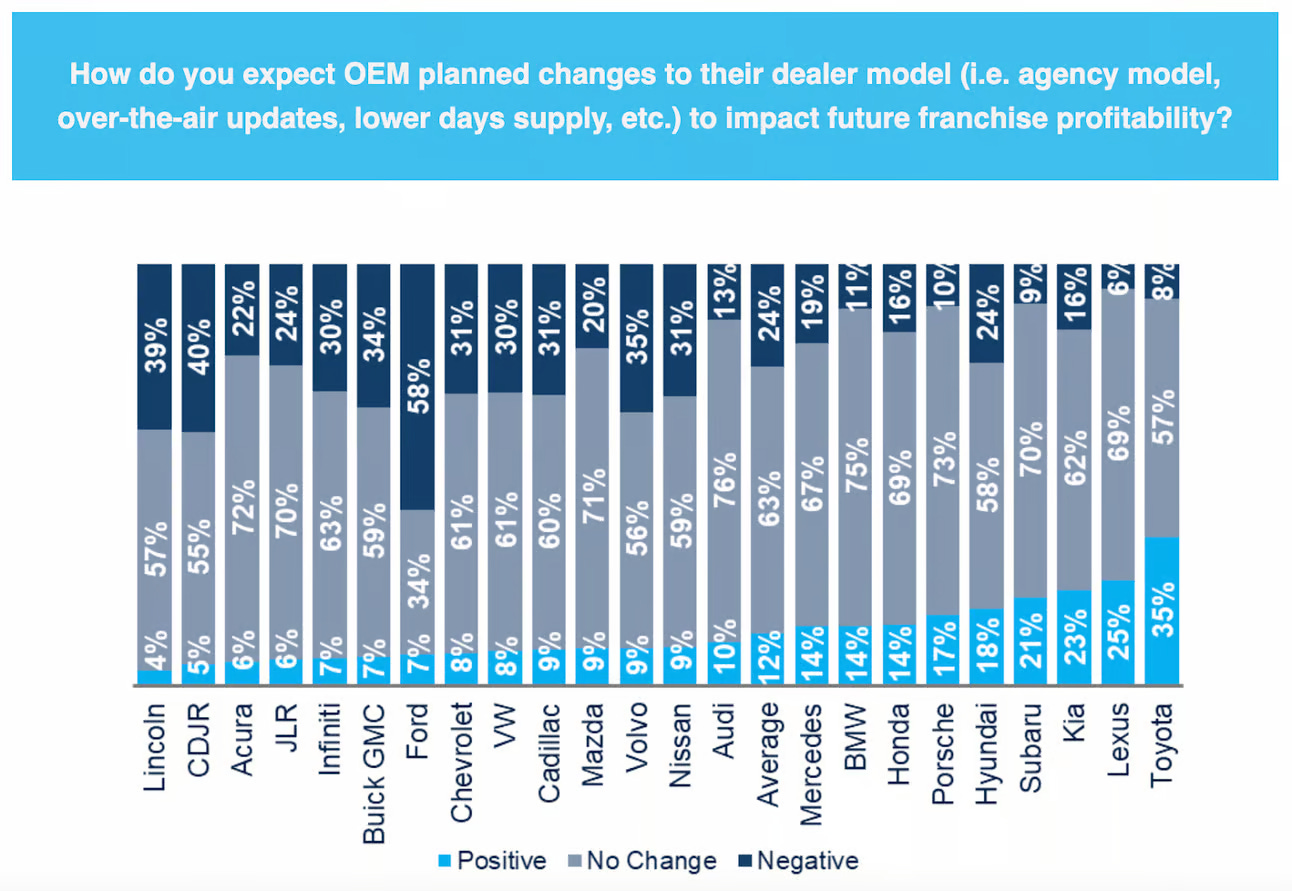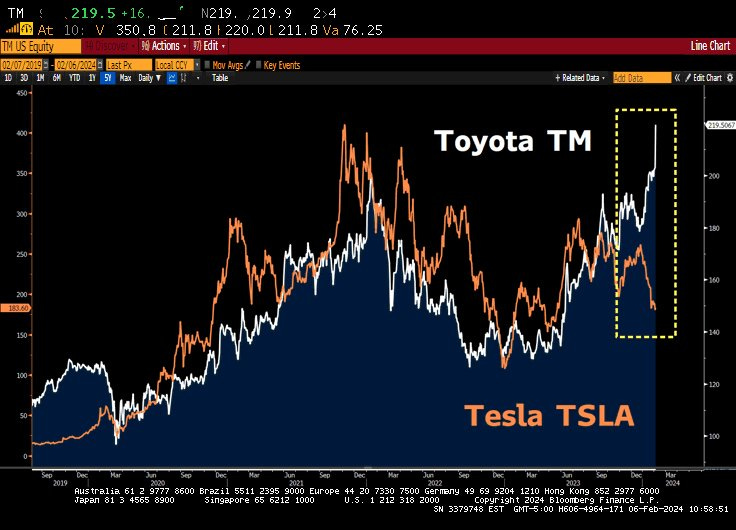Toyota: Trend Continuation Play
Theme: Hybrid over Battery Electric Vehicles; TM over TSLA
Let’s go back before we go forward.
Here was my CLUB/EDGE recommended Swing-into-Trend set up for Toyota last half of 2023:
November 16th: TM - NEW Trend Long - on watch for trend breakout
Toyota was a recommended #swing-ideas long back in early June on my "stalking value rotation" theme. It delivered and then some - first from it's EV production numbers and then from its earnings report. Fast forward a few months and TM has had some pushback at my PT of $191.91 (where I rec'd closing the Swing Long for very nice gains), but now seems to have digested that level well and looks like it is getting ready to push above.
Today I read the latest @CarDealershipGuy reporting how Ford is losing dealers' trust but Toyota scores highest among them all (see ratings chart):
”Consider Toyota, which was the most trusted by dealers in the survey and scored 17 percentage points higher than its nearest non-luxury competitor, Subaru. Toyota also has the highest blue sky multiple of all non-luxury franchises.
What sets Toyota apart? Despite inventory challenges over the last few years, it’s been forthcoming to dealers about its departure from the rest of the EV crowd—it believes EVs are the future, but it’s taken a more measured approach to rolling EVs out on lots and relied on hybrids to smooth out the transition. That’s what makes a manufacturer trustworthy in the eyes of a dealer…and I hear it all the time—dealers are manufacturers' best customer and best source of growth.”
With that, $180 wkly close above is important to keep this one in trend; or wait for trigger above $192 that holds!
TM Position Update Pre-Earnings
Since this November client post, Toyota has continued to slowly grind higher, but I think the best is yet to come.
For example, TM trades for a very low PE under 10 with expected earnings to post 5.53 EPS vs 4.08 a year ago.
Compared to Tesla, TM was at 8x earnings whereas TSLA was at 78x earnings as of the beginning of 2024. Another reason TSLA has made a stellar short since $263.55 rejection at weekly resistance (-30%), and TM has continued to trend higher (+12%) since Jan 1st, 2024.
Just seems like a lot of room for this ‘value’ play to grow, especially in light of my bullish bent on Japan since April 2023, affectionately referred to as “My Buffett Bet”.
Toyota January US sales - posted Feb 1st - also confirm solid growth: up 23.3% for Toyota on volume basis:
Toyota Division sales for the month totaled 143,241 vehicles, up 25.7% on a volume basis. Lexus Division sales for the month totaled 22,512 vehicles, up 10.1% on a volume basis.
TMNA's January 2024 U.S. electrified sales totaled 60,248 vehicles, up 82.5% on a volume basis, representing 36.3% of total sales volume.
Toyota Division's electrified sales totaled 52,330 vehicles, up 94.4%. The Division's electrification sales represented 36.5% of total sales volume.
Lexus Division's electrified sales totaled 7,918 vehicles, up 30.2%. The Division's electrification sales represented 35.2% of total sales volume.
I also like how TM is positioned in and against the EV market, as our CLUB/EDGE Swing Portfolio Manager + Equity Analyst, @Tiff, summarizes very nicely below!
TM - Toyota is reporting earnings in the morning. This newish trend-trade I recommended is a strong hold.
The Hybrid Vs. EV Debate
The debate between hybrid and electric vehicles (EVs) has gained momentum, especially in light of recent challenges faced by EV owners in various parts of the U.S.. Hybrid vehicles are currently a more practical and reliable choice compared to electric vehicles, based on various factors including reliability, performance in extreme weather conditions, and consumer trends.
Reliability Concerns of EVs
Consumer Reports' annual car reliability survey found that EVs from the past three model years had 79% more problems than conventional cars. In contrast, hybrids were reported to have 26% fewer problems than conventional models, despite having both a conventional powertrain and an electric motor. The graph below illustrates the average difference of problem rates over the last three model years.
The enhanced reliability of hybrid vehicles can be linked to their well-established history in the automotive industry. For instance, the Toyota Prius, a pioneering hybrid model, has been available for over 25 years. On the other hand, many electric vehicles (EVs) are being developed by traditional car manufacturers who are relatively new to EV technology or by emerging companies such as Rivian. This novelty often results in initial difficulties and challenges in reliability. “The growing pains and the need for time to resolve these issues are to be expected,” notes Jake Fisher, the senior director of auto testing at Consumer Reports. Among the most frequently encountered problems by EV owners are those related to the electric drive motors, charging issues, and battery problems of the EVs. It's important to note that the mentioned charging issues pertain to the vehicles themselves rather than to home or public charging stations.
Consumer Reports has newly recommended Tesla's Model Y, noting an improvement in owner-reported problems, and continues to recommend the Model 3. Despite Tesla's extensive experience in producing EVs for over a decade, the company faces challenges with vehicle build quality. Steven Elek from Consumer Reports points out that while Tesla's EV components, like powertrains, are generally reliable, issues with build quality—such as irregular paint, malfunctioning door handles, and improperly closing trunks—negatively impact the brand's reliability score. However, these build quality issues are not as heavily weighted in Consumer Reports' reliability assessments as more severe problems like those related to the engine, transmission, or drivetrain.
Plug-in hybrid electric vehicles (PHEVs) are considered the least reliable vehicle category, with 146% more problems reported than conventional cars, according to Consumer Reports. Fisher explains that PHEVs combine elements of electric vehicles (EVs) and conventional cars, leading to more potential issues. An example highlighted is the Chrysler Pacifica minivan, where the conventional version is recommended due to high reliability, while its PHEV counterpart scores below average in reliability and is not recommended, primarily due to issues with its hybrid drivetrain and charging system. However, Fisher notes exceptions to this trend, like the Toyota RAV4 Prime plug-in hybrid, which ranks as one of the most reliable models in their survey, and the Ford F-150 hybrid, which contradicts the general strong reliability trend of hybrids. Fisher emphasizes the importance of evaluating the reliability score of specific models before making a purchase decision.
Performance in Extreme Weather Conditions:
The performance of EVs in extreme weather conditions further tilts the scale in favor of hybrids. During a cold wave in Chicago, Tesla owners faced significant challenges with their vehicles' battery life. Batteries died, and charging stations took much longer than usual to charge, leaving cars immobile. What should have been a 45 minute charge took over two hours. Tesla recommends keeping the charge level above 20% in cold weather, as EVs use more energy to heat the battery and cabin, impacting their performance significantly. Hybrids, with their dual power sources, do not face such drastic reductions in efficiency in cold climates.
Consumer Trends Favoring Hybrids over EVs:
S&P Global Mobility found that households with gas-powered cars were more likely to transition to a hybrid or plug-in hybrid than to a fully electric vehicle. This trend suggests a consumer preference for the perceived reliability and practicality of hybrids.
The report found that 8.3% of internal combustion engine (ICE) households that purchased a new vehicle between January and October of 2023 purchased a hybrid; this trend, according to S&P steadily increased throughout the year, reaching 9.9% in October.
Comparatively, 5.7% of ICE households that purchased a new vehicle in October purchased an all-electric car.
Though this trend has also been steadily increasing, it is doing so at a slower rate than the hybrid migration trend.
In October of 2021, 6.5% of ICE households migrated to hybrids, a number that fell to 6.1% in October of 2022 before jumping to nearly 10% in October of 2023.
In October of 2021, 3.3% of ICE households migrated to fully electric EVS, a number that rose to 4.6% by October of 2022 and 5.7% by October of 2023.
"The automotive industry's transformation to fully electric may not be as rapid as EV advocates are hoping, as US consumers increasingly opt for more sustainable and energy-efficient vehicles," Tom Libby, associate director for loyalty solutions and industry analysis for S&P Global Mobility.
"This consumer trend of taking a half-step by choosing a hybrid instead of moving directly to an EV may be a sign of tentativeness to fully embrace electricity as the means of propulsion."
Pricing Power of Hybrids
Hybrids tend to be more economically accessible than EVs. Data from AutoCreditInisight by S&P and Transunion revealed that the average monthly payment for owners of hybrids was $670, significantly lower than the $828 average for EV owners and $798 for plug-in hybrids. This price difference makes hybrids a more feasible option for many consumers.
Global sales of EVs, which include hybrids and fully electric EVs, topped 13.5 million units in 2023, a new record that indicated 31% year-over-year growth.
This comes as legacy automakers, including Ford and General Motors have pulled back and postponed some of their EV investments, citing issues with demand and profitability.
Known for its pioneering Prius, Toyota is the leader in the hybrid vehicle market with a broad lineup of hybrid models.
Toyota has advocated for the promotion of hybrid vehicles, recognizing that consumers may not yet be entirely prepared to fully embrace the transition to complete electrification.
TM Position Update POST-Earnings
TM - crushed earnings!! CONGRATS LONGS! Anything above $213.74 is blue skies, with “Protect To” level of $195.
Toyota Motor (TM) raised its full-year operating profit forecast by nearly 9% and revs to Y43.5T from Y43T after its Q3 earnings topped analysts' estimates thanks to a weaker yen and strong sales of high-margin cars and hybrid vehicles; operating profit for the third quarter ended Dec. 31 was 1.68 trillion yen, beating the average 1.3 trillion yen profit estimate.
Here is a summary review by LongYield
Toyota Motor Corporation Earnings Release FY2024 Third Quarter Financial Summary:
📈 Operating income for the first 9 months reached 4.24 trillion yen, a significant increase of +2.14 trillion yen YoY. Full-year forecast is set at 4.90 trillion yen.
🚗 Sales volume saw a rise in all regions, with HEVs (Hybrid Electric Vehicles) up by +37.9% YoY, highlighting a robust demand for environmentally friendly vehicles.
💰 The increase in operating income was attributed largely to effective marketing efforts (such as volume increase, mix improvement, and price revision), which, along with cost reduction initiatives, helped counter the high materials costs post-COVID-19.
🛠️ To address production challenges and semiconductor shortages, Toyota is closely working with suppliers and dealers to expedite vehicle delivery to customers, while also focusing on enhancing safety, quality, and workplace environment.
🌱 The profit increase for FY2024 is primarily from the new car business, with ongoing efforts to transform into a mobility company. Toyota aims to leverage its customer base of 100 million car owners to strengthen its value chain and establish long-term relationships.
📊 Consolidated vehicle sales for the first 9 months of FY2024 were 7.21 million, up to 7.91 million YoY (109.7%). Electrified vehicle sales surged to 2.84 million (141.4%), with significant growth in BEVs (429.5%) and PHEVs (156.5%).
Trade the Hype; Invest in Value
This is the take-away from all that is written above.
When the Tesla fan boys were adamant that EV would replace internal combustion engines, it was fun to chase the momentum that comes with a celebrity CEO.
Much ignored was Toyota's Chairman who discussed in detail why Battery Electric Vehicles will peak at 30% penetration, and why they chose to focus on Hybrids, instead.
THAT investment is where I helped to position CLUB/EDGE clients early, but not too early. ;-)
Trade the hype; invest in value.
As @JaguarAnalytics reminds:
Carbon YTD:
Toyota Motors $TM up +19.8%
Honda $HMC up +11.5%
General Motors $GM up +6.8%
Electric YTD:
Tesla $TSLA down -36.1%
Rivian $RIVN down -34.7%
BYD $BYDDY down -15.5%
I will close with this chart posted by @ConvertBond highlighting the large divergence between the former high-flyer of MAG7 player TSLA with the rise of TM.
And again, CONGRATULATION TOYOTA LONGS AND TESLA SHORTS, many of whom are my clients. ;-))





